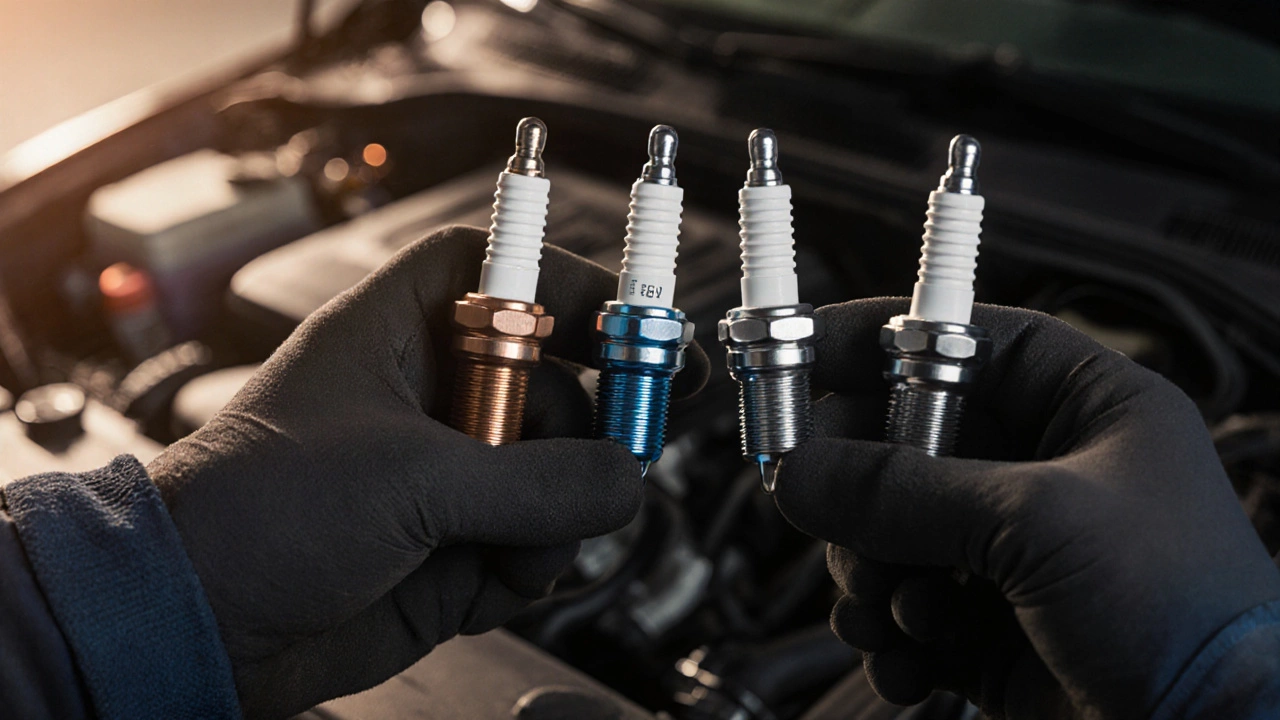
Spark Plugs: What They Do, How Long They Last, and When to Replace Them
When your engine fires up, it’s the spark plug, a small but critical component that creates the electric spark to ignite fuel in the combustion chamber. Also known as an ignition plug, it’s the heartbeat of gasoline engines—no spark, no start, no drive. You won’t see it unless you pop the hood and dig past the ignition coils, but if it fails, your car won’t move. And unlike brake pads or oil filters, most people don’t think about spark plugs until the engine starts misfiring, sputtering, or refusing to turn over.
Spark plugs don’t last forever. Most last between 30,000 and 100,000 miles, depending on the type. Standard copper plugs wear out faster—often around 30,000 miles—while platinum and iridium ones can go twice as long. But mileage isn’t the only factor. Aggressive driving, poor fuel quality, or a dirty air filter can make them wear out sooner. And if you ignore a failing spark plug, you don’t just lose power—you risk damaging your catalytic converter, wasting fuel, or even triggering a check engine light that leads to expensive diagnostics.
It’s not just about the plug itself. The ignition system, the full chain of components that delivers voltage to the spark plug includes coils, wires, and sensors. A bad coil can mimic a bad spark plug. A cracked plug boot can cause misfires. That’s why some posts in this collection focus on symptoms like rough idling, poor acceleration, or hard starts—not just to tell you when to replace the plug, but to help you spot what’s really wrong.
And it’s not just about old cars. Even modern engines with advanced fuel injection and computer controls still rely on spark plugs. Electric vehicles don’t need them, but if you drive a petrol or hybrid car in India—whether it’s a Maruti Alto or a Toyota Fortuner—you’re running on spark plugs. And with fuel prices fluctuating, keeping them in good shape means better mileage and fewer surprises on the road.
Some people think spark plugs are a "set it and forget it" part. They’re not. They’re like tires: you don’t wait until they’re completely gone to check them. You look for signs. A black, oily tip? That’s oil burning. A white, chalky tip? That’s overheating. A gap that’s widened too much? That’s wear. You don’t need a garage to spot these clues. A quick visual check with a plug socket and a flashlight can save you from a tow truck.
This collection brings together real-world advice on spark plug lifespan, signs of failure, replacement costs, and how to avoid being upsold on unnecessary upgrades. You’ll find posts that break down the differences between iridium and copper plugs, explain why some engines need special plugs, and show you how to tell if your misfire is the plug—or something else entirely. We also cover related issues like ignition coils and fuel efficiency, because spark plugs don’t work in isolation. They’re part of a system. And when one part fails, it drags the rest down with it.
Whether you’re trying to fix a rough idle, save money on fuel, or just understand why your car won’t start on a cold morning, the answers are here. No fluff. No theory. Just what works, what doesn’t, and what you need to know before you open your hood.
-
16 Jan

-
11 Oct

Do Spark Plugs Boost Horsepower? Fact vs. Myth
Find out if swapping spark plugs can actually add horsepower, which plug types give the biggest lift, and how to install them for real gains. -
12 May

Spark Plugs: How Do I Tell If I Need New Ones?
This article explains easy-to-spot signs that your spark plugs might need replacing. You'll read about common symptoms, why spark plugs matter, and how to check them yourself. There are practical tips to save you time and money. Plus, you'll find out the cost of waiting too long and a few lesser-known facts about what spark plugs actually do. -
20 Apr

What Happens If You Wait Too Long to Change Spark Plugs?
Ignoring spark plug replacement can turn a smooth ride into a headache. Worn-out spark plugs mess with your engine, fuel use, and could even break other expensive parts. This guide breaks down why timely replacement actually saves you money and stress. You'll learn how delays affect performance, what warning signs to watch for, and how to dodge costly mistakes. Real-world tips and straight talk—no fluff, just the stuff you actually need. -
14 Apr

What Happens if I Drive with Bad Spark Plugs?
Driving with bad spark plugs can lead to several issues that affect your car's performance, fuel efficiency, and overall health. In this article, we'll explore the immediate and long-term impacts of neglecting spark plug maintenance. You'll discover how faulty spark plugs can reduce power, increase fuel consumption, and even cause engine damage. Learn how to recognize the symptoms of bad spark plugs and find out why regular replacement is essential for smooth driving. -
31 Mar

Do Spark Plugs Affect Your Car's Exhaust?
Understanding how spark plugs influence your car's exhaust can help improve engine performance. This article explores the role of spark plugs in the exhaust process, shedding light on their impact on emissions, fuel efficiency, and engine health. We provide practical tips for maintaining spark plugs for better exhaust outcomes. Dive into the mechanics of spark plugs and how they are crucial to a well-running vehicle. -
17 Mar

How Often Should I Clean Spark Plugs?
Spark plugs play a critical role in your engine's performance, and knowing when to clean them can enhance efficiency. Regular maintenance ensures they deliver optimal performance by reducing engine misfires and fuel consumption. Cleaning intervals vary based on driving conditions and vehicle type, but observing key signs like poor acceleration or starting issues can guide you. This article offers practical insights into proper cleaning methods and the importance of spark plug maintenance for every car owner.





